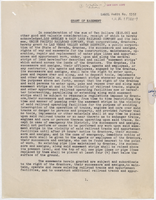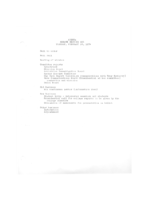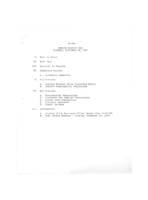Search the Special Collections and Archives Portal
Search Results
Evelyn Stuckey Papers
Identifier
Abstract
The Evelyn Stuckey Papers date from 1940 to 1972 and document Stuckey's experience as a physical education teacher at Las Vegas High School (LVHS) in Las Vegas, Nevada and founder of the LVHS Rhythmettes dance group. The collection contains personal and educational materials from Stuckey’s college years, personal correspondence, and photographs. It also contains materials documenting the Rhythmettes' activities including travel plans, posters and fliers, news clippings, and group rosters.
Archival Collection

Nathalie Martinez oral history interview: transcript
Date
Archival Collection
Description
Oral history interview with Nathalie Martinez conducted by Rodrigo Vazquez and Barbara Tabach on June 24, 2021 for Latinx Voices of Southern Nevada Oral History Project. Nathalie Martinez, one of the original members of the Latinx Voices project team, dicusses her personal history and the history of her parents who immigrated to the United States from Colombia and El Salvador. She shares her educational background and experiences working as an interviewer for the Latinx Voices project before its culmination and her graduation in 2021. Nathalie also talks about her work on the project's podcast and her work linguistically translating the interviews from Spanish to English.
Text

Grant of easement, Las Vegas Land and Water Company, Audit No. 5352, June 1, 1954
Date
Archival Collection
Description
Granting of an easement by the Union Pacific Railroad to the Las Vegas Valley Water District for the purpose of maintaining the water supply facilities. Notarized by Louis Scholnick in Douglas County, Nebraska on June 3, 1954.
Text

Meeting minutes for Consolidated Student Senate, University of Nevada, Las Vegas, February 26, 1974
Date
Archival Collection
Description
Text

Meeting minutes for Consolidated Student Senate, University of Nevada, Las Vegas, November 12, 1974
Date
Archival Collection
Description
Text

Interview with Oscar Foger, May 5, 2005
Date
Archival Collection
Description
Text

Transcript of interview with Bruce Layne by Claytee D. White, June 18, 2004
Date
Archival Collection
Description
Bruce Layne came to Las Vegas in March of 1955 when he was 10 years of age. He attended High school at Bishop Gorman and college at the University of Nevada Las Vegas where he received a B.S. in Economics. In college, he played baseball for three years and was named All Conference Player in 1966. Growing up in Las Vegas, two of his closest long time friends are Governor Bob Miller and Tito Tiberti. Bruce later went on to become the President of Layne & Associates Insurance which was the largest Insurance Agency in Nevada. Bruce tells fabulous stories of his 40-year experience in the Las Vegas community. When he first arrived there were only about 25,000 people living here. Since then, Bruce has been witness to the enormous growth the city has undergone. Throughout the interview, he discusses his book, My Gift, which he wrote after he discovered he had Parkinson's disease in 1999. The book contains valuable advice on life and it has touched the lives of many people who have read it. Today Bruce Layne is relentlessly fighting his battle with Parkinson's disease both for himself and for thousands of others. He continues to have a positive attitude and is supported by his wife, Sherry Layne, and his two sons, Chad and Trevor. VI
Text

Transcript of interview with Ray Keith by David Alexander, March 3, 1980
Date
Archival Collection
Description
On March 3, 1980, David Alexander interviewed community volunteer, Ray Keith (born October 1st, 1911 in Montgomery, Alabama) in her home in Las Vegas, Nevada about her life and memories of Southern Nevada. The two discuss how Keith first arrived in Las Vegas and the addresses that she has lived at. The interview concludes with Keith explaining how she helped to charter the “Home of the Good Shepherd” housing facilities with local Las Vegas women in the sixties.
Text

Ruth E. Hazard interview, March 10, 1981: transcript
Date
Archival Collection
Description
From the Ralph Roske Oral History Project on Early Las Vegas, OH-00822. On March 10, 1981, Joseph L. Erb interviewed Ruth E. Hazard (born June 25th, 1907 in Marshall, Michigan) in Las Vegas, Nevada. At the time of the interview, Ruth had lived in Nevada for over forty years. Ruth discusses living and working in Las Vegas and Carson City, Nevada. She also covers various subjects including: the atomic tests and the growth of the hotel industry.
Text

Transcript of interview with Elbert Edwards by Layne Covington, October 16, 1986
Date
Archival Collection
Description
On October 16, 1986, Layne Covington interviewed Elbert Edwards (born 1907 in Panaca, Nevada) about his life in Southern Nevada. Edwards first talks about his family background before talking about what it was like to live in Panaca. He then talks about changes in Southern Nevada, particularly those in Boulder City that have taken place over time. Edwards later talks about the work of his wife and both of their political involvement and his involvement and career in education. The latter part of the interview includes discussion of the building of Boulder Dam, Edwards’ job as a registrar in the Selective Service, and the effects that the war years had on Las Vegas.
Text
